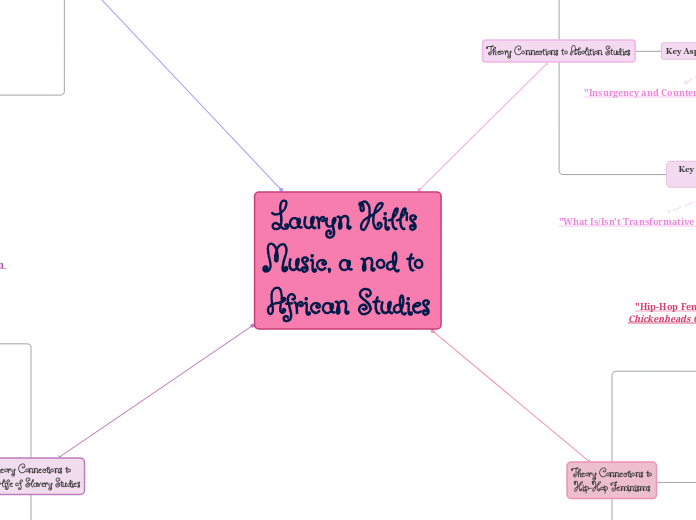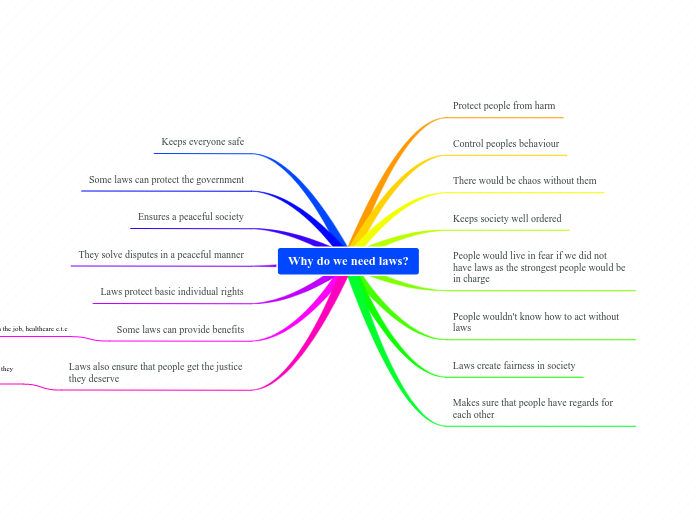"Insurgency and Counterinsurgency"
"Abolition and Reparations"
"What Is/Isn't Transformative Justice?
"Introduction." from Afro-Pessimism
"Afterlife of Slavery Studies" from Feb. 9th, 2023 Lecture
"Note on Libidinal Economy" from Feb. 7th, 2023 Lecture
Lecture 4/20/2023 Week 14: "Trap Feminism, Fatness and Some Bad Bitches"
"Introduction" from The Games Black Girls Play
"Hip-Hop Feminist" from When Chickenheads Come Home to Roost
"Epilogue: Abolitionist Imperatives" from White Reconstruction
“Invisible Bodies: Anti-Black Genocide in the U.S.” from Zone of Non-Being Blog
"Introduction: The Urgency Imperative of Genocide" from Never Meant to Survive
Lauryn Hill's "Doo Wop (That Thing)", "Consumerism", and "Black Rage" all showcase her connections to Afterlife of Slavery Studies by pointing out the ongoing impact of slavery and systemic oppression on the Black experience in modern society. These songs warn the Black community of the ways in which the legacy of slavery continues to shape the experiences and opportunities of Black people. By alluding to these themes, she highlights the importance of understanding and addressing the afterlife of slavery in modern society.
In "I Gotta Find Peace of Mind", Lauryn Hull explores themes of self-care and inner peace as forms of feminist resistance, and highlights the importance of prioritizing mental health and well-being as a black female artist in an industry that looks to suppress the power of black women. In "Ex Factor", she utilizing other Black female voices to produce a beautiful symphony, showcasing the power and talent that black women possess. Lastly, in "Doo Wop", she challenges traditional gender roles and expectations, and emphasizes the importance of women having the freedom to define themselves on their own terms. These themes are undoubtedly connected to Hip-Hop Feminisms, which emphasize the importance of a woman's experiences and perspectives within the realm of hip-hop as a platform for feminist activism.
In "I Gotta Find Peace of Mind" Lauryn Hill critiques the oppressive nature of society and emphasizes the importance of finding inner peace as a form of abolition/resistance. In "Final Hour", she calls for collective action in dismantling the white supremacist, patriarchal structures that fuel systemic oppression. These themes highlight Hill's connections to Abolition Studies, which emphasize the need for collective action and resistance in creating a just society.
Overarching Analysis
"I Get Out", "Black Rage", and "Final Hour" all showcase Lauryn Hill's connections to Genocide Studies by addressing the legacy of slavery and systemic oppression that the Black community faces. These songs critique the structures of power that reinforce this oppression while emphasizing the need for collective action to dismantle these structures. By engaging with these themes, Hill draws connections to Genocide Studies and brings awareness to the ongoing impact of genocide on the Black community.
Theory Connections to
Hip-Hop Feminisms
Key Aspect: Respectability Politics
and/or Black Anality
Connection to Lauryn Hill - "Doo Wop"
"Black Anality" lecture 4/20/2023. "Black Anality" is the theory that only vulgar, erotic verbiage is used to describe the black body in a sensual, sexual way. Words like "EBONY", "GHETTO BOOTY", "EBONY SLUT TAKES IT IN THE ASS AND LOVES IT", and "EBONY ANAL" are identifiers of black women, which I found interesting in comparison to the way white women are described gracefully, and fantasized about in pornographic conversation. I believe that in the "Doo Wop" lyrics Lauryn Hill is alluding to this when she offers advice to the Black female community in the first half of the song. Hill warns the Black female community of the dangers of "Black Anality", and even goes as far as to warn the Black male community of the same dangers. Such an interesting connection, I can't wait to research it soon!
Key Aspect: Black Girls are at the Center of Hip-Hop Culture
Connection to Lauryn Hill - "Ex Factor"
In relation to the background vocals on the track. Women working together, vocalizing, harmonizing, and using the games girls play in a sense. Them "playing" together produced a record-breaking track, hitting ____ on the Billboard's. This is a prime example of the games girls play being at the center (and eventually the top) of Hip-Hop culture.
Key Aspect: "Fuckin' wit the Grays"
Connection to Lauryn Hill "Doo Wop" music video
or
"I Gotta Find Peace of Mind"
In the "Doo Wop" music video Lauryn Hill is embodying the concept of "fuckin' wit the grays" by showing side-by-side representations of what black beauty looks like. In the video she compares her image of black beauty and success (a reggae, soul, unconventional, alternative, and authentic version of herself) to that of which is expected by her peers and critics (a done up, hyper sexualized version of herself). Though she raps about something different, her visuals here touch the concept deeply in my mind.
In the lyrics of "I Gotta Find Peace of Mind", Lauryn Hill could be alluding to her relationship with hip-hop. She talks about how he (in reference to the masculinization of hip-hop) has caused a lot a pain, but at the same time how "[he] loves [her] despite [her]self". From this juxtaposition, we could infer that she feels love from hip-hop music despite its tendency to degrade black women. The lyrical narrative of the relationship's tumultuous nature is related to the concept of "fuckin' wit the grays", because she describes looking for peace as she navigates how to appreciate hip-hop in it totality while also critiquing it to make it better.
I think it's also important to note how I believe this narrative is addressed to all black women. The relationship is not only toxic on the individual level (the ways in which Lauryn's relationship with hip-hop affects her), but also toxic to all black women in hip-hop. This toxicity is infectious, and serves as evidence for the divide between black female MCs that rap about uplifting black queens, and those who confront the taboo surrounding sexuality. For instance, some black female artists look down upon others who rap about eroticism and reinforce harmful stereotypes about black women. To mediate the divide, Lauryn Hill encourages black feminists to "fuck wit the grays" as she acknowledges and critiques that aspect of hip-hop, but also appreciates the art that comes of it as well.
Theory Connections to Abolition Studies
Key Aspect: The REAL Transformative Justice
I love how Andrienne Brown questions our cultivation of a fear-based adherence to common values of the Black community. She sheds light on the normalized tendency to belittle people in a way that affirms our values, and to then call that seeking justice. She criticizes the use of social media as a platform to tear people down and to reinforce toxic cancel culture, and instead urges us to practice transformative justice. Brown makes it a point to explain that as a society we have a false idea of what transformative justice means. She says, "We call it transformative justice when we're throwing knives and insults, exploding each other's worst mistakes, reducing each other to moments of failure. We call it holding each other accountable." On the other hand, she explains that transformative justice practices should address and generate solutions from the root of the problem, "such that the conditions that create injustice are transformed".
Lauryn Hill's "Final Hour" is related to this REAL transformative justice in the way that she addresses systemic oppression while promoting a true sense of accountability. In the song, she critiques the oppressive systems and notions that this country was built upon, and the ways in which they perpetuate violence and inequality. For instance, take a look at the following stanza:
Don't discuss the baby mother (Nah)
Business, I been in this third LP you can't tell me
I witness first-handed, I'm candid, you can't stand it
Respect demanded, and get flown around the planet
Here, Hill is talking about her experience with people tearing her down for having a child so young, and attacking her character in the media. She explains that she combats this by being honest about her story, confronting the fallacious transformative justice practices, and by demanding respect, which showcases her actively practicing the REAL transformative justice.
Key Aspect: (Counter) Insurgency
Lauryn Hill's "I Get Out" is related to counterinsurgency in many ways. For the purpose of this connection, I'd like to draw attention to a specific stanza:
Your stinking resolution is no type of solution
Preventing me from freedom, maintaining your pollution
I won't support your lie no more
I won't even try no more
Here, Lauryn Hill is calling out organizations, public figures, and powerful people of the sort for engaging in counterinsurgency practices that are masked as helpful, "long over due" attempts to uplift the Black community. Practices like DEI trainings, scholarship programs made for black students, etc. seemingly adhere to abolitionist ideals, but in reality are used to push forward a performative activist agenda. As Hill describes, "stinking resolutions" like these are "no type of solution". Instead, they reinforce the racist, patriarchal notions that this country was built upon, while simultaneously fortifying the power, cultural capital, and advantage that white people have over black people.
Key Aspect: Abolitionist Praxis Centered in Care, Dignity, and Accountability
Connection to Lauryn Hill -
"I Gotta Find Peace of Mind"
Lauryn Hill's "I Gotta Find Peace of Mind" is related to Patrisse Cullor's unique interpretation of abolition praxis in the sense that they're both centered around the idea of healing and self-care as integral components of social justice. In the song, Hill sings about her struggle to find inner peace in her battle against external pressures. The repetition of the line "I gotta find peace of mind" throughout the song, serves to stress the importance of taking care of oneself and of finding a sense of purpose beyond societal expectations. Her urgency and passion help deliver her message of encouraging social change with undertones of care, dignity, and accountability. Similarly, in her work, Patrisse Cullors argues that abolitionist praxis should be centered in care, dignity, and accountability because social change requires a deep commitment to caring for oneself and others, upholding dignity of everyone, and being accountable for one's own actions and the impact they might have on others.
Theory Connections to
Afterlife of Slavery Studies
Key Aspect: Afro Pessimism
Lauryn Hill's "Black Rage" can be connected to the concept of Afro-pessimism, or the theoretical framework that argues that anti-blackness is a fundamental aspect of modern society with an emphasis on the ongoing legacy of slavery and systemic oppression that shape the Black experience. The lyrics speak to the intergenerational trauma that Black people have experienced as a result of these legacies. The song specifically highlights the anger and pain that Black people have endured and emphasizes the need for collective action. The following stanzas strengthen the aforementioned connection:
Black Rage is founded on two-thirds a person
Rapings and beatings and suffering that worsens
Black human packages tied up in strings
Black rage can come from all these kinds of things
Black rage is founded on blatant denial
Squeezed economics, subsistence survival
Deafening silence and social control
Black rage is founded on wounds in the soul
Key Aspect: Racism is Built into
the DNA of America
Connection to Lauryn Hill -
"Consumerism"
Lauryn Hill intentionally uses adjectives to describe how whiteness (and therefore racism) is built into the DNA of America. She names a lot of -isms in what I think is an attempt to showcases the factors working against the success of blackness in this country. Racism, capitalism, separatism, television (referring to propagandistic media coverage) to name a few all work to suppress blackness and to maintain white supremacy. The following stanza was referenced in the aforementioned connection:
Ageism, sexism, racism, chauvinism
Capitalism running through them like the rumour business
Separatism, skepticism, modernism, atheism
Television running through them like an organism
Mechanism, despotism, poisoning the ecosystem
Satanism running through them like a politician
Hedonism, hypocrism, nihilism, narcissism
Egotism running through them, need an exorcism
Key Aspect: Libidinal Economy of
Anti Blackness
Connection to Lauryn Hill - "Doo Wop (That Thing)"
For the connection, please take a look at the following stanza:
Now that was the sin that did Jezebel in
Who you gon' tell when the reprocussions spin
Showing off your ass 'cause you're thinking it's a trend
Girlfriend, let me break it down for you again
You know I only say it 'cause I'm truly genuine
Don't be a hard rock when you really are a gem
Baby girl, respect is just a minimum
Niggas fucked up and you still defending 'em
The libidinal economy of anti-blackness is a term used to describe the ways in which anti-black racism transcends institutionally racist policies and practices, and is further rooted in the emotional attachments to Blackness as a grounds for degradation, violence, and death. It’s important to mention that the libidinal economy is also heavily involved with a sense of pleasure that’s derived from the domination, abjection, and fulfillment of a sexual desire to engage with the Black body. “Doo Wop (That Thing)” is also undoubtedly related to the concept of the libidinal economy of anti-blackness. The lyrics address issues surrounding the harmful stereotypes about Black women that are perpetuated by both men and women in the music industry and society at large. In the song, Hill sings about the pressures Black women face to conform to certain standards of beauty and behavior, which are often based on racist and hyper-sexualized notions of Black femininity. She also critiques the way in which black men participate in the libidinal economy of anti-blackness by perpetuating these stereotypes and treating Black women as objects of desire and control.
Theory Connections to Genocide Studies
Key Aspect: White Ontological Coherence
Connection to Lauryn Hill - "Final Hour"
Lauryn Hill's "Final Hour" is closely related to the concept of white ontological coherence, or the concept that whiteness is often constructed as the normative way of being in society. This harmful construction marginalizes people of color and their experiences; by consistently taking over the narrative of what's good, what's pure, and what people should strive to be/look like, whiteness uses whatever is left to describe blackness (what's negative, what's bad, what people shouldn't strive to be/look like, etc.)
The following example drives the point home:
I'm about to change the focus from the riches to the brokest
I wrote this opus, to reverse the hypnosis
Whoever's closest to the line's gonna win it
You gonna fall trying to ball while my team win the pennant
Key Aspect: Slavery IS Antiblack Genocide
Connection to Lauryn Hill - "Black Rage"
Lauryn Hill's "Black Rage" is related to the idea that slavery is anti-Black genocide in that it highlights the systemic oppression and the intergenerational trauma that Black people have faced as a result of the legacy of slavery and ongoing racism. Her lyrics simultaneously recognize the resistance and the resilience of Black people in the face of this ongoing oppression which can be seen in the following stanza:
Black rage is founded on two-thirds a person
Rapings and beatings and suffering that worsens,
Black human packages tied up in strings,
Black rage can come from all these kinds of things
This message is consistent with the idea that slavery was a form of anti-Black genocide since it involved the brutalization and dehumanization of Black people for the benefit of white supremacy. Similar to other genocides, the legacy of slavery continues to shape the experiences of the Black community today.
Key Aspect: Anti-Black
Pornographic Society
Connection to Lauryn Hill - "I Get Out"
For the purpose of this connection, take a look at this stanza:
Just get out, just get out, just get out
Let's get out, let's get out
Knowin' my condition is the reason I must die
Just get out
Here, Lauryn Hill's verbiage is very intentional and relates closely to the idea that we live in an anti-Black pornographic society. To end the song with this powerful line, effectively delivers the strong warning message to the Black community. In the third line, "Knowin' my condition is the reason I must die", I'm inferring that her condition is her blackness and that she's insinuating that we live in a world where people die simply for being black. The subtle vulgarity of this line alludes to the normalized vulgarity of black death in this country. For example, when a black person dies at the hands of police, they are paid tribute in the media but nothing else comes about to change those statistics. Despite the brutality of the murders, the young age of the victims, etc. we as a society have become numb to black death, hence the idea that we live in an anti-black pornographic society.
Lauryn Hill's Music, a nod to African Studies









